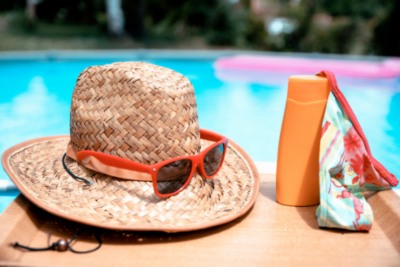Sunshine Safely: A Guide to Summer Wellness, Sun Protection, and Eye Care
As the summer sun invites us outdoors, it’s essential to balance the joys of outdoor activities with the need to protect our skin and eyes from harmful UV rays. At Brevard Health Alliance, we understand the importance of summer safety, which is why we’ve created this extensive guide to help you navigate the sunny season with confidence, care, and a focus on safeguarding your skin and eyes.
Understanding Sun Exposure:
While sunlight offers health benefits like Vitamin D production and mood enhancement, prolonged exposure to ultraviolet (UV) radiation poses risks to our skin and eyes. According to the World Health Organization (WHO)1, overexposure to UV radiation is the primary cause of skin cancer, including melanoma, squamous cell carcinoma, and basal cell carcinoma. Additionally, the Environmental Protection Agency (EPA)2 warns that UV exposure can contribute to various eye conditions, including cataracts and macular degeneration.
“It is important to avoid spending long periods of time in the sun without the proper protection. Too much sun exposure may lead to sunburn, which is not only painful but can lead to dehydration if a large surface area of your skin is affected,” explains Brevard Health Alliance Family Medicine Provider, Dr. Nicholette Fox, MD. “Repeated sun exposure without adequate protection increases your risk of developing skin cancer and can be very damaging to your eyes. The good news is that you can lower your risks by following these simple steps below.”
Summer Safety Tips:
- Seek Shade Strategically: Seek shade under trees, umbrellas, or other structures, especially during peak sunlight hours between 10 a.m. and 4 p.m. This practice reduces direct UV light exposure and lowers the risk of sunburn, skin damage, and eye strain.
- Dress for Protection: Wear lightweight, long-sleeved clothing made from tightly woven fabrics to shield your skin from UV rays. Wide-brimmed hats and sunglasses with UV protection are also essential for protecting your face, neck, and eyes from harmful UV radiation.
- Apply Sunscreen Liberally: Choose a broad-spectrum sunscreen with an SPF of 30 or higher and apply it generously to all exposed skin. Remember to reapply every two hours, or more frequently if swimming or sweating profusely. Be sure to use sunscreen formulated for sensitive skin around your eyes and avoid direct contact with the eyes.
- Hydrate Regularly: Staying hydrated is crucial for overall health and can help prevent dehydration-related eye strain and discomfort. It is important to drink plenty of water throughout the day, especially when spending time outdoors in hot, sunny conditions.According to the The Mayo Clinic3, adequate daily fluid intake is considered:– About 15.5 cups (3.7 liters) of fluids a day for men
– About 11.5 cups (2.7 liters) of fluids a day for women
“Drinking water is one of the most important things you can do when spending time in the sun,” stresses Dr. Fox. “If you are not well hydrated, your body may be unable to cool itself down via sweating, which can cause your body temperature to rise to dangerously high levels and lead to heat stroke.”
- Be Sun-Smart near Reflective Surfaces: Reflective surfaces like water, sand, and concrete can intensify UV radiation, increasing the risk of sunburn, skin damage, and eye irritation. Take extra precautions, such as wearing sunscreen, sunglasses, and seeking shade, when near these surfaces.Eye Protection:In addition to safeguarding your skin, protecting your eyes from UV radiation and other potential hazards is essential for maintaining optimal eye health. Consider the following tips for eye protection:– Choose sunglasses labeled with UV protection to block 100% of both UVA and UVB rays.
– Wear wrap-around sunglasses or those with large lenses to provide maximum coverage and minimize
peripheral UV exposure.
– Consider polarized lenses to reduce glare and enhance visual comfort, particularly during water or
snow-related activities.
– Use protective eyewear, such as safety goggles or sunglasses with impact-resistant lenses, when engaging
in sports or activities with a risk of eye injury.
As you enjoy outdoor adventures this summer, remember that prioritizing sun safety and eye protection is key to maintaining your health and well-being. By following these guidelines and staying vigilant about skin and eye care, you can embrace the sunshine safely and make the most of the season.
“Speak with your primary care provider at BHA for more information about how you can practice sun safety this summer!”
At BHA, we are dedicated to promoting community health and wellness. For further guidance on sun safety, eye care, or general healthcare inquiries, don’t hesitate to contact our knowledgeable team of healthcare professionals. Together, let’s ensure that this summer is filled with sun-kissed memories and healthy habits.
To request an appointment with a BHA provider, Call or Text: 321-241-6800 or Request an Appointment online.
References:
- World Health Organization (WHO): Ultraviolet radiation
- Environmental Protection Agency (EPA): Health Effects of UV Radiation
- The Mayo Clinic: “Water: How much should you drink every day?”
 Nicholette Fox is a Family Medicine and Pediatrics provider, caring for adults and children. She holds a Doctor of Medicine degree from St. George’s University.
Nicholette Fox is a Family Medicine and Pediatrics provider, caring for adults and children. She holds a Doctor of Medicine degree from St. George’s University.














































































































































